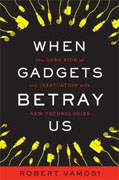When Gadgets Betray Us
Robert Vamosi
book reviews:
· general fiction
· chick lit/romance
· sci-fi/fantasy
· graphic novels
· nonfiction
· audio books
· author interviews
· children's books @
curledupkids.com
· DVD reviews @
curledupdvd.com
newsletter
win books
buy online
links
home
for authors
& publishers
for reviewers

 |
When Gadgets Betray Us: The Dark Side of Our Infatuation With New Technologies Robert Vamosi Basic Books Hardcover 240 pages March 2011 |
|
When Gadgets Betray Us
When Gadgets Betray Us As our world relies more and more on technology to make life simpler for us, we are leaving behind what Vamosi calls “electronic breadcrumbs” that can be, in essence, used to track our move and the details of our life – where we go, what we buy. The information acquired can be easily replicated and used to access any system that we think is secure. Vamosi points out that even fingerprint scanners can be fooled by creating dummy images or three-dimensional models made from gelatin such as is found in gummy bears or other candy. One example of getting around the fingerprint scanner involved a car thief cutting the tip of the left index finger from the owner of the car. Some of the methods of eliminating or decreasing the corruption of personal security systems involve the use of retina scanning, vein pattern recognition or a three-factor authentication—which would require, for example, a retina scan, voice recognition and a password. Currently the FAA combines finger and iris scans in its security and identification system. Though the multi-level identification still doesn’t eliminate all corruption of security systems, it makes it harder for criminals to replicate our identities and gain access into private accounts and systems. However, Vamosi argues that the accountability for change must lie in the consumers to both be educated in the use of their gadgets and push for change with companies that collect data, so that the consumers can control of the trail of personal data that they leave as they use the technological gadgets. Vamosi’s writing is extremely clear, detailed and chockfull of examples of our technical devices can so easily betray us. Though understandable by the layman, this book contains comprehensive technical information that would be better appreciated by those who are somewhat tech savvy. When Gadgets Betray Us Originally published on Curled Up With A Good Book at www.curledup.com. © Maya Fleischmann, 2012 |
|
|
|
 Click here to learn more about this month's sponsor! |
|
| fiction · sf/f · comic books · nonfiction · audio newsletter · free book contest · buy books online review index · links · · authors & publishers reviewers |
|
| site by ELBO Computing Resources, Inc. | |
 Author Robert Vamosi describes a world where consumers are so fascinated and dependent on technology and convenience that they have given up commonsense judgment and their own sense of survival instincts for a misplaced sense of trust in the technology. Vamosi makes a clear and persuasive argument for staying ahead of the technology by creating multi-layered identification and security systems that will better protect our property and identities; but more importantly he presents a convincing argument about why it is necessary for companies and consumers that create and use these gadgets to rethink how to keep their data secure.
Author Robert Vamosi describes a world where consumers are so fascinated and dependent on technology and convenience that they have given up commonsense judgment and their own sense of survival instincts for a misplaced sense of trust in the technology. Vamosi makes a clear and persuasive argument for staying ahead of the technology by creating multi-layered identification and security systems that will better protect our property and identities; but more importantly he presents a convincing argument about why it is necessary for companies and consumers that create and use these gadgets to rethink how to keep their data secure.